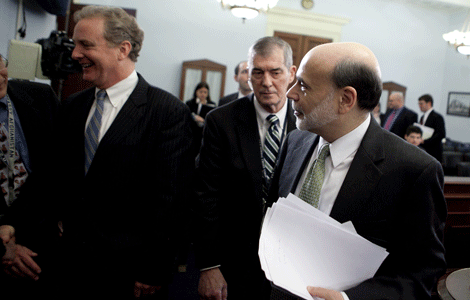Economy
Bernanke urges yuan rethink
Updated: 2011-02-11 07:46
By Tan Yingzi and Li Woke (China Daily)
|
Ben Bernanke, chairman of the US Federal Reserve (right), and Representative Christopher Van Hollen, a Democrat from Maryland, (left), leave after a House Budget Committee hearing on economic outlook and monetary and fiscal policy in Washington, DC. Andrew Harrer / Bloomberg |
But Chinese economists say US policies fuel global inflation
WASHINGTON / BEIJING - US Federal Reserve Chairman Ben Bernanke said on Wednesday China's recent measures to control its inflation by raising interest rates is "surprising" and urged Beijing to let its currency rise.
Chinese economists said the US should stop its monetary easing policy, which would help Beijing's fight against rising inflation.
On Thursday, the central parity rate of the yuan rose to a record high of 6.5849 against the US dollar, slightly higher than the previous record of 6.585 set on Wednesday. It has risen against the dollar for three consecutive trading days.
The yuan has appreciated by 3.7 percent against the dollar since mid-June. On an inflation-adjusted basis, the appreciation was even higher, rising at an annual rate of more than 10 percent, according to the US Treasury currency report last week.
At a hearing of the House of Representatives Budget Committee, Bernanke criticized China's handling of its inflation-control policy by raising interest rates instead of the value of its currency.
Echoing a complaint among US lawmakers about China's exchange rate reform, the chairman added that Beijing should let the yuan appreciate. His comments came a day after China pushed up its benchmark interest rates a quarter-point for the third time in four months.
Some Chinese economists said that Beijing should demand that Washington ends its "harmful" quantitative easing monetary policy.
The US has rolled out its $600 billion stimulus plan, the second round of quantitative easing, but the policy harms the interests of other countries, because it would lead to rising international prices and drive capital into emerging markets, causing higher inflation in those countries, including China, analysts said.
"Every country has a responsibility to maintain the stability of the international markets and assets," said Zhao Xijun, deputy director of the Institute of Finance and Securities at the Renmin University of China. "But what the United States is doing with quantitative easing does not show it cares about the effect on other countries."
Meanwhile, US lawmakers said on Wednesday they would introduce legislation to punish China for keeping the yuan artificially cheap.
The move came days after the US Treasury Department cleared China of accusations of currency manipulation last week, but said there was "insufficient" progress for the yuan to appreciate. This came despite the China's decision in June to make its exchange rate more flexible and the yuan's subsequent 3.7 percent appreciation.
On Thursday, Chinese Foreign Ministry spokesman Ma Zhaoxu said China will continue its policy for exchange rate reform, but currency value is not the cause of bilateral trade gap.
Economists have agreed that the yuan's value is not the real cause of the China-US trade gap. The US' lack of manufacturing competitiveness, its block of high-tech exports to China and its overblown calculation of China's exports are some of the real causes, they said.
China Daily
E-paper

Ear We Go
China and the world set to embrace the merciful, peaceful year of rabbit
Preview of the coming issue
Carrefour finds the going tough in China
Maid to Order
Specials

Mysteries written in blood
Historical records and Caucasian features of locals suggest link with Roman Empire.

Winning Charm
Coastal Yantai banks on little things that matter to grow

New rules to hit property market
The State Council launched a new round of measures to rein in property prices.

